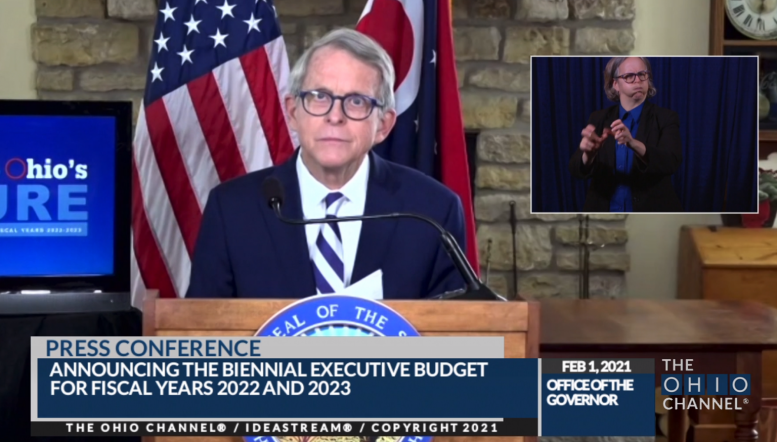Gov. Mike DeWine is sticking with his pledge to veto any legislation in 2021 targeting the authority of Ohio’s public health officials.
Even as Ohio continues to see a downward trend of new COVID-19 cases and hospitalizations, the governor said this is not the time to minimize the executive branch’s authority to respond to a pandemic.
“We are not out of this yet,” he said Tuesday. “We cannot declare victory.”
Republicans are once again trying to limit the power of the governor and the Ohio Department of Health through Senate Bill 22 (and its companion legislation in the Ohio House of Representatives). Sen. Theresa Gavarone, R-Bowling Green, is a co-sponsor of the senate bill.
The legislation, if enacted, would give lawmakers the ability to rescind any public health order issued by the ODH as well as emergency declarations issued by the governor.
Public health officials from throughout Ohio have come out against the bill, including nearly two-dozen local health departments and Dr. Bruce Vanderhoff, the ODH chief medical officer.

The bill sponsors say the changes are necessary to provide legislative oversight for executive branch decisions that affect businesses, schools and Ohioans’ personal freedoms.
Policy researchers at the Ohio Statehouse have suggested the proposed legislation may be unconstitutional. DeWine said he believes it to be unconstitutional.
The governor pointed not just to the ongoing efforts to slow the spread of COVID-19 but the impending work to mitigate a variant of the deadly virus. He noted Dr. Vanderhoff would be addressing the issue of a coronavirus mutation at Thursday’s press conference.
“This is not the time for us to be cutting our authority, (the) health department’s authority back in regard to protecting the people of the state,” DeWine said. “It also has long-term ramifications well beyond this governor, well beyond this health department, well beyond this pandemic … I think it would just be a grave, grave mistake.”
The governor said he’s told fellow Republicans in the Statehouse of his plans to veto SB 22 should the Ohio General Assembly approve it.
The question becomes whether this legislation would have enough support to override his veto. It takes a three-fifths vote to override, or at least 60 of the 99 state representatives along with 20 of the 33 state senators.
Reaching that threshold was a struggle for the Republican caucuses in 2020, but the party managed to gain seats in both chambers headed into the legislative term beginning in 2021. Republicans now hold 65 seats in the Ohio House of Representatives and 25 in the Ohio Senate, meaning they have an even wider supermajority and potentially a greater shot at overriding a veto of SB 22.
Before any of that can happen, the legislation must first be advanced from committees and passed by each chamber. A Senate committee is holding another hearing on SB 22 this morning.
***
Also from Ohio Capital Journal:
DeWine refuses to explain aide’s role in bailout scandal
If you asked most people to start up a dark money group and then funnel more than $1 million through it and into another such group, they’d probably want to know what it was going to be used for.
But now that the second 501(c)(4) dark-money group, Generation Now, has pleaded guilty to being at the heart of one of the biggest bribery and money laundering scandals in Ohio history, Gov. Mike DeWine is refusing to discuss what one of his top aides was told when he formed the first dark money group, Partners for Progress.
Generation Now pleaded guilty earlier this month to being the major conduit of money between Akron-based FirstEnergy and related organizations and the effort to pass House Bill 6, a $1.3 billion bailout that mostly went to two nuclear plants FirstEnergy started spinning off in 2016. DeWine signed the bill into law in 2019.
Last summer, federal authorities arrested then-Speaker Larry Householder and four associates as part of the scandal and two of the associates later pleaded guilty. READ MORE
Education budget debate begins as January budget shows declines in higher ed, K-12
Subcommittees on K-12 and higher education are beginning their discussions on the new operating budget this week, and they have plenty of budgetary information to look at, including declines shown in the January budget report.
The Ohio House Finance subcommittee on higher education will take their first look at the pieces of the state operating budget that touch on higher education this week
As they look to the future of funding colleges and universities in the state, the Office of Budget and Management gave a look at last month’s disbursements, and year-to-date funding disbursements that were below estimates.
According to the most recent OBM monthly budget data report, January disbursements for higher education was 3.9% below estimates, a total of $7.2 million less than the month before. READ MORE
ACA marketplace is open again for insurance sign-ups. Here’s what you need to know.
For people who’ve been without health insurance during the pandemic, relief is in sight.
In January, President Joe Biden signed an executive order to open up the federal health insurance marketplace for three months as of Monday so uninsured people can buy a plan and those who want to change their marketplace coverage can do so.
Consumer advocates applauded the directive. Since 2016, the number of Americans without health insurance has been on the rise, reaching 30 million in 2019. The economic upheaval caused by the novel coronavirus has made a bad situation worse, throwing millions off their insurance plans. READ MORE
HELP OHIO CAPITAL JOURNAL GROW Make a tax-deductible donation.





